
Burundi's relations with its neighbours have often been affected by security concerns. Hundreds of thousands of Burundian refugees have at various times crossed to neighboring Rwanda, Tanzania, and the Democratic Republic of the Congo. Hundreds of thousands of Burundians are in neighboring countries as a result of the ongoing civil war. Most of them, more than 340,000 since 1993, are in Tanzania. Some Burundian rebel groups have used neighboring countries as bases for insurgent activities. The 1993 embargo placed on Burundi by regional states hurt diplomatic relations with its neighbors; relations have improved since the 1999 suspension of these sanctions.
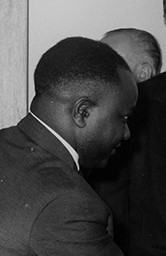
Pierre Ngendandumwe was a Burundian politician. He was a member of the Union for National Progress and was an ethnic Hutu. On 18 June 1963, about a year after Burundi gained independence and amidst efforts to bring about political cooperation between Hutus and the dominant minority Tutsis, Ngendandumwe became Burundi's first Hutu prime minister. He served as prime minister until 6 April 1964 and then became prime minister again on 7 January 1965, serving until his death. Eight days after beginning his second term, he was assassinated by a Rwandan Tutsi refugee.
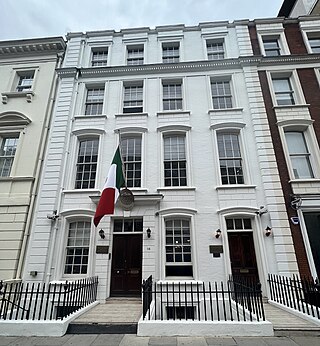
The Embassy of Mexico in London is the diplomatic mission of Mexico in the United Kingdom. Mexico also maintains a building at 8 Halkin Street in Belgravia which serves as the Ambassador’s Official Residence.

The High Commission of Uganda in London is the diplomatic mission of Uganda in the United Kingdom. It is located in Uganda House, next to Admiralty Arch on Trafalgar Square; it shares the building with the Embassy of Burundi.
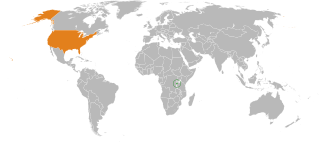
In 1962, the United States established diplomatic relations with Burundi when it gained its independence from Belgium. Following independence, the country experienced political assassinations, ethnic violence, and cyclical periods of armed conflict; several governments were installed through coups. The 2000 Arusha Peace and Reconciliation Agreement provided a negotiated settlement framework that, along with later ceasefire agreements, led to the end of the 1993-2006 civil war. President Pierre Nkurunziza's decision to seek a third presidential term in 2015 sparked protests in the capital and was followed by a failed coup d’état. The resultant violence and political and economic crises resulted in massive refugee flows to neighboring countries. The United States Embassy in Burundi's policy states: "The United States supports the achievement of long-term stability and prosperity in Burundi through broad, inclusive reconciliation; humanitarian assistance; economic growth; and the promotion of political openness and expansion of democratic freedoms. The United States supports the East African Community (EAC)-facilitated Burundian dialogue and other conflict resolution efforts within Burundi. The United States seeks to facilitate Burundi's deeper integration into regional and international markets, as a means to promote sustainable economic development."

The following outline is provided as an overview of and topical guide to Burundi:

The Embassy of Kuwait in London is the diplomatic mission of Kuwait in the United Kingdom. It is located just off Knightsbridge at Albert Gate, one of the entrances to Hyde Park. It is situated immediately opposite the French Embassy.

The Embassy of the People's Republic of China in the United Kingdom of Great Britain and Northern Ireland is the diplomatic mission of China in the United Kingdom, located in London. Established in 1877 as the Chinese Legation, the London mission was China's first permanent overseas diplomatic mission. It has served as the diplomatic mission of the Manchu Qing Empire, the Republic of China, and the People's Republic of China. It was the location of the Qing Empire's detention of Sun Yat-sen, an important episode in the Chinese revolution of 1911. It remains today the focal point for events relating to China held in the United Kingdom, including celebrations in 2012 to commemorate 40 years of diplomatic relations between the UK and the People's Republic of China.

The Embassy of the Philippines in London is the diplomatic mission of the Philippines in the United Kingdom. It is located on a cul-de-sac near Trafalgar Square. The Philippines also maintains a Trade Section at 1a Cumberland House, Kensington Court, South Kensington.

The Embassy of Monaco in London is the diplomatic mission of the Principality of Monaco in the United Kingdom.

The Embassy of Morocco in London is the diplomatic mission of Morocco in the United Kingdom. Morocco also maintains a Consulate at 97/99 Praed Street, Paddington.
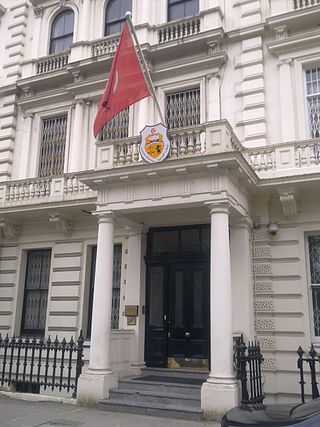
The Embassy of Tunisia at 29 Princes's Gate in the South Kensington district of London is the diplomatic mission of Tunisia in the United Kingdom.

The Embassy of Turkey in London is the diplomatic mission of Turkey in the United Kingdom. There was an embassy of the Ottoman Empire in London dating from 1793; this was suspended in 1914 following the outbreak of the First World War and replaced by the embassy of the new Republic of Turkey in 1924. From 1901-1954 the embassy was located at 69 Portland Place before moving to its current location; however this building was kept and is currently used as the Ambassador's Residence.

Burundi–India relations are the international relations that exist between Burundi and India. Apart from bilateral relations, India also engages with Burundi through the African Union and the Regional Economic Communities (RECs).

The Ikiza, or the Ubwicanyi (Killings), was a series of mass killings—often characterised as a genocide—which were committed in Burundi in 1972 by the Tutsi-dominated army and government, primarily against educated and elite Hutus who lived in the country. Conservative estimates place the death toll of the event between 100,000 and 150,000 killed, while some estimates of the death toll go as high as 300,000.
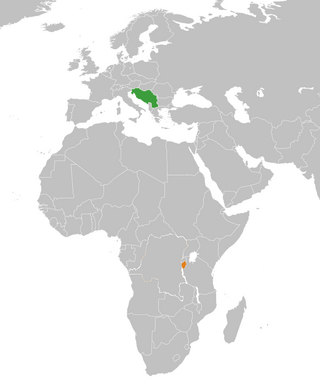
Burundi and the former Socialist Federal Republic of Yugoslavia were both members of the Non-Aligned Movement and they developed their relations in the framework of the Cold War Third World cooperation.




















